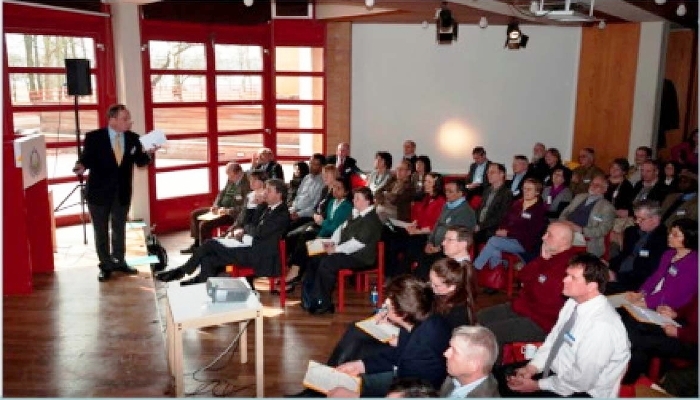![]()
The Words of the Piepenburg Family
|
|
The Words of the Piepenburg Family |

Berlin, Germany -- The first conference of the German National Peace Council in 2011 ended with an appeal to the German Bundestag to finally ratify the 2003 UN Convention against Corruption: "We appeal to the members of parliament to ratify the UN Convention against Corruption from 2003, thus enabling the country to be rated much lower in the Corruption Perception Index than is the case now." The Convention was signed by the Federal Republic of Germany along with 148 more states but never ratified at home.
The conference was arranged by UPF-Germany under the title "A society in search -- which values can guarantee our future?" Some 80 participants from all over Germany were in attendance.
A further resolution specifies six "values" which need to be upheld for guaranteeing a peaceful and harmonious society in the future: to understand God as the transcendental center of humankind; the necessity to live for the sake of the common good; to acknowledge the important role of the family; to consider religion and science as mutual supplements of life and existence; to honor and respect the spiritual dimension of life; and to advance cooperation and dialogue among races and religions.
The conference had two main topics: "Values for the future: contributions from religion and philosophy" and "Values for the future: ethics in economics and politics."
Dr. Elke Preusser-Franke, President of the Jewish Women's Association of Dresden, explained the significance of the Torah and the laws as God-given values to mankind in general and the Jewish people in particular. Katja Winkler, scientific assistant at the Chair for Christian Anthropology and Social Ethics at the University of Mainz and member of the research project "Forgoing coercion in religious traditions" at the University of Munster, discussed values seen from a Christian-Catholic viewpoint. The Catholic understanding of values changed over history, which becomes quite obvious in the concluding remarks of the Second Vatican Council. Ali Alinc, member of the International MIHR Foundation, based in Turkey, talked about values from an Islamic perspective, yet always referring to the other Abrahamic traditions of Judaism and Christianity as well, referring to all three religions as coming from the same source. Francisco Conidi, philosopher and teacher at the faculty for linguistic sciences at the University of Cologne, explained the role humanism played in shaping the postulates of the Universal Declaration ofl Human Rights. Humanism is primarily concerned about the questions of who are we as human beings and what is needed for our happiness in our concrete world, not just in the hereafter. Humanism initially did not simply reject any notion of God and religion but merely questioned the spiritual leadership of the churches.
During the second part of the conference, Dr. Joachim Reuter, an economist and author, talked on the subject "Ethics in economics and the social market economy." He suggested that managers subject themselves to a sort of "Hippocratic oath for economists." The young generation of managers understands the need for such an oath and is willing to comply. Dr. Dietrich Seidel, a former teacher at the Unification Theological Seminary in New York, put the family at the center of his contemplations. Partnership can only function when the partner is placed in the central position, not one's own ego. Alois Serwaty, head of the Near-Death Experience Network and publisher of numerous books on the same topic, spoke on the shift of values in people with borderline experiences. All of a sudden, the individual career is no longer the center of all endeavors, but more altruistic attitudes take priority. Dr. Reuter then gave a second talk on "Science and Religion." Richard Dawkins' points in his famous book The God Delusion can all be refuted, one by one.
As we can learn from quantum physics, one particle can have contradicting qualities at the same time, which cannot be explained in purely scientific terms. When science turns into an exclusive belief system, it mutates to hubris. Science and religion are no contradiction. Karl-Christian Hausmann, President of UPF-Germany, finally talked on "Values from the perspective of Unification Philosophy." We are living in a society of material affluence where three successive generations have not experienced war. Yet a mounting restlessness can be observed among society. The confidence of the public in politics and economics is steadily eroding. Many speak about changing values, but what is generally happening is a loss of values. Fundamental values are practiced and passed on to future generations within the family. Once values such as respect and support for each other as brothers and sisters are lost, no government can foot the bill. Politics should be more concerned with researching and promoting such values instead of only trying to catch up with social developments and attempting to merely justify what is happening.